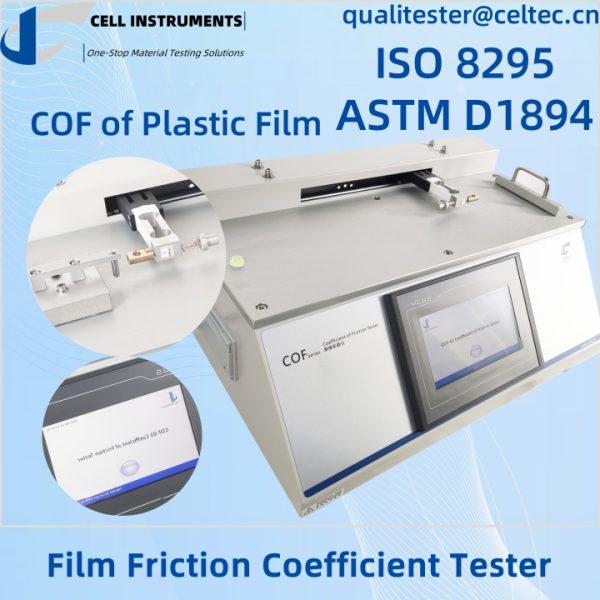Film Friction Coefficient Tester for Plastic Films: A Comprehensive Guide
Introduction
The film friction coefficient tester is an essential instrument for evaluating the frictional properties of films and sheeting materials. Accurate measurement of the coefficient of friction (CoF) is crucial in industries such as packaging, medical devices, pharmaceuticals, adhesives, textiles, and more. This article delves into the features, benefits, and applications of film friction coefficient testers, with a focus on meeting ASTM D1894 and ISO 8295 standards.
What is the Film Friction Coefficient Tester?
The film friction coefficient tester is designed to measure the static and kinetic friction of plastic films and sheets. These measurements are critical for ensuring material performance and quality, as they influence the ease of processing, handling, and end-use characteristics of the materials.
Key Features of Film Friction Coefficient Testers
High Precision
- Film friction coefficient testers are engineered for high accuracy, providing reliable CoF measurements with minimal variability.
User-Friendly Interface
- The intuitive controls and software make the equipment easy to operate, even for users with minimal technical expertise.
Versatility
- These testers are suitable for a wide range of materials, including smooth films, rough textiles, and adhesive surfaces. Customization options are available to meet specific testing requirements.
Robust Design
- Built for durability, film friction coefficient testers require minimal maintenance, ensuring long-term reliability.
Technical Specifications
- Load Cell: 5 N (or as required)
- Accuracy: 0.5 F.S.
- Sled: 200±1g (or as required)
- Sled Size: 63.5mm*63.5mm (or as required)
- Test Speed: 100mm/min (ISO), 150mm/min (ASTM)
- Dimensions: 540mm(L)*380mm(W)*240mm(H)
- Weight: NW 21kg
- Power: 110~220V 50/60Hz
Test Methods: ASTM D1894 and ISO 8295
ASTM D1894
ASTM D1894 is a standard test method for measuring the CoF of plastic film and sheeting. It provides a consistent methodology for ensuring comparability of results across different laboratories and industries.
ISO 8295
ISO 8295 is an international standard for determining the CoF of plastic films and sheeting. It ensures uniform testing procedures and results consistency on a global scale.
Testing Procedures
Calibration
- Ensure the equipment is calibrated according to the manufacturer’s instructions.
Sample Preparation
- Cut samples to standard sizes and condition them at 23°C and 50% relative humidity for at least 48 hours.
Testing
- Secure the sample on the test sled and the counterpart material on the test bed. Initiate the test by moving the sled at a constant speed and record the static and kinetic friction forces.
Data Analysis
- Analyze the results using the provided software to determine the CoF values.
Applications and Industry Use Cases
Packaging Materials
- CoF testing ensures that packaging materials do not stick together excessively or slide apart too easily, affecting the integrity and usability of packaging.
Medical and Pharmaceutical
- For medical devices and pharmaceutical packaging, controlling the CoF is vital to ensure safety, functionality, and compliance with regulatory standards.
Textiles and Adhesives
- In textiles, the CoF affects fabric hand feel and performance. For adhesives, it determines bonding strength and ease of application.
Why Choose Cell Instruments’ Film Friction Coefficient Tester?
Cell Instruments offers state-of-the-art film friction coefficient testers designed to meet diverse client needs. Our equipment ensures precise, reliable results, enhancing your quality control processes. With customization options and exceptional customer support, we are committed to helping you achieve optimal material performance and compliance with industry standards.
FAQs
What is the CoF of plastic film?
- The coefficient of friction (CoF) of plastic film quantifies the resistance encountered when two surfaces slide against each other. It is measured using a film friction coefficient tester.
How does ASTM D1894 apply to CoF testing?
- ASTM D1894 provides a standardized method for measuring the CoF of plastic film and sheeting, ensuring consistent and comparable results across different laboratories.
What are the benefits of using a film friction coefficient tester?
- Benefits include high precision, user-friendly interface, versatility, robust design, and reliable long-term performance.
Why is CoF testing important for packaging materials?
- CoF testing ensures that packaging materials have the right balance of friction, preventing them from sticking together excessively or sliding apart too easily, which can affect their usability and integrity.
Can film friction coefficient testers be customized?
- Yes, Cell Instruments offers customization options to meet specific testing requirements, ensuring tailored solutions for diverse materials and applications.
By understanding the importance of film friction coefficient testers and adhering to ASTM D1894 and ISO 8295 standards, you can enhance your quality control processes and ensure the optimal performance of your materials.
Related Products
Coefficient of Friction Testing Equipment
Related Article
Dynamic Friction Testing Machine
Coefficient of Friction of Plastic Films
Coefficient of Friction of Paper
Friction Test Method for Packaging Films
Friction Testing for Paper Products
Friction Test Equipment for Paper Products
Friction Coefficient Tester for Paper

